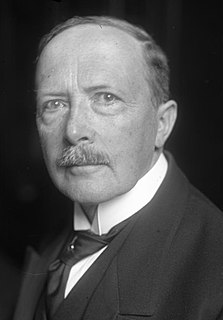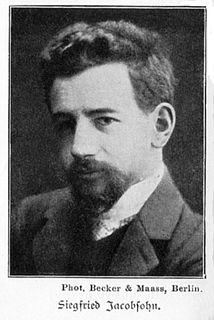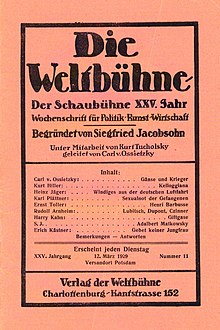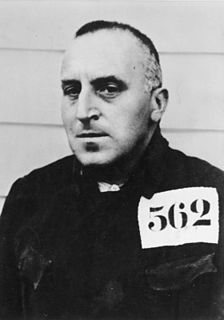
Carl von Ossietzky was a German pacifist and the recipient of the 1935 Nobel Peace Prize for his work in exposing the clandestine German re-armament.

The Reichswehr formed the military organisation of Germany from 1919 until 1935, when it was united with the new Wehrmacht.

Kurt Ferdinand Friedrich Hermann von Schleicher was a German general and the last Chancellor of Germany during the Weimar Republic. A rival for power with Adolf Hitler, Schleicher was murdered by Hitler's SS during the Night of the Long Knives in 1934.

Walter Simons was a German lawyer and politician. He was Foreign Minister of the Weimar Republic in 1920-21 and served as president of the Reichsgericht from 1922 to 1929.

Gustav von Wangenheim was a German nobleman, actor, screenwriter and director.

Hellmut Georg von Gerlach was a German journalist and politician.

Siegfried Jacobsohn was a German writer and influential theatre critic.

The 14th Infantry Division was a German military unit which fought during World War II.

German rearmament was a policy and practice of rearmament carried out in Germany during the interwar period (1918–1939), in violation of the Treaty of Versailles. It began on a small, secret, and informal basis shortly after the treaty was signed, but it was massively expanded after the Nazi Party came to power in 1933.

The Ruhr uprising or March uprising (Märzaufstand) was a left-wing workers' revolt in the Ruhr region of Germany in March 1920. The uprising took place initially in support of the call for a general strike issued by the Social Democrat members of the German government, the unions and other parties in response to the right-wing Kapp Putsch of 13 March 1920.

Rudolf Olden was a German lawyer and journalist. In the Weimar period he was a well-known voice in the political debate, a vocal opponent of the Nazis, a fierce advocate of human rights and one of the first to alert the world to the treatment of Jews by the Nazis in 1934. He is the author of Hitler der Eroberer. Entlarvung einer Legende which is considered part of the German exile literature. The book was promptly banned by the Nazis. Shortly after its publication by Querido in Amsterdam, Olden's citizenship was revoked and he emigrated, together with his wife, first to the United Kingdom and then, in 1940, to the United States. On September 18 both died in the U-boat attack on the SS City of Benares in the Atlantic.
The Kama tank school was a secret training school for tank commanders operated by the German Reichswehr at Kazan, Soviet Union. It operated from 1929 to 1933. The school was established in order to allow the German military to circumvent the military restrictions on tank research spelled out in the Treaty of Versailles. Similar schools were established in the Soviet Union for German pilots and German military officers training in gas warfare. Following the Nazi party's rise to power, the school was closed and Germany's Tank Force and Air Force were trained in Germany.
Walter Kreiser was a German aircraft designer and journalist, best known for publishing an article in the magazine The World Stage in 1929, which exposed the secret creation of a secret German Air Force in violation of the Treaty of Versailles, getting him convicted in 1931 of treason and esponage, receiving 18 months in prison (Weltbühne-Prozess) along with future (1935) Nobel Peace Prize winner Carl Ossietzky.

Gustl Ferdinand Mollath is a German man who was acquitted during a criminal trial in 2006 on the basis of diminished criminal responsibility; he was committed to a high-security psychiatric hospital, as the court deemed him a danger to the public and declared him insane based on expert diagnoses of paranoid personality disorder. Mollath's forensic incarceration for seven years and the surrounding legal judgments became the basis of a public controversy in Bavaria and the whole of Germany when at least some underlying elements of his supposedly fabricated paranoid story about money-laundering activities at a major bank turned out to be true after all. Mollath himself had consistently claimed there was a conspiracy to have him locked up in a psychiatric care ward because of his incriminating knowledge; evidence turned up in 2012 made his claims appear plausible.

Johann Burianek was a militant campaigner against the one party dictatorship in the German Democratic Republic and a member of the "Struggle against Inhumanty" group .
The December Constitution is a set of six acts that served as the constitution of the Cisleithanian half of Austria-Hungary. The acts were proclaimed by Emperor Franz Joseph on December 21, 1867 and functioned as the supreme law of the land until the collapse of the empire in 1918. Five of the Constitution's acts were replaced by the Federal Constitutional Law between 1918 and 1920; the sixth law, a bill of rights, is still in force.

Rastatt Fortress was built from 1842 to 1852. The construction of this federal fortress was one of the few projects that the German Confederation was able to complete. The fortress site covered the Baden town of Rastatt and, in 1849, played an important role during the Baden Revolution. It was abandoned in 1890 and most of it was eventually demolished.
The Lohmann affair or Phoebus affair was a scandal in the Weimar Republic in Germany in 1927, that was the uncovering of a secret rearmament program in the course of the bankruptcy of the production company Phoebus Film AG. In addition to the dismissal of Walter Lohmann on 19 January 1928 and the dismissal of the Chief of the Reichsmarine Hans Zenker, on 30 September 1928, it also led to the resignation of the Reichswehr Minister Otto Gessler.
Berthold Jacob was a German journalist and pacifist.

























